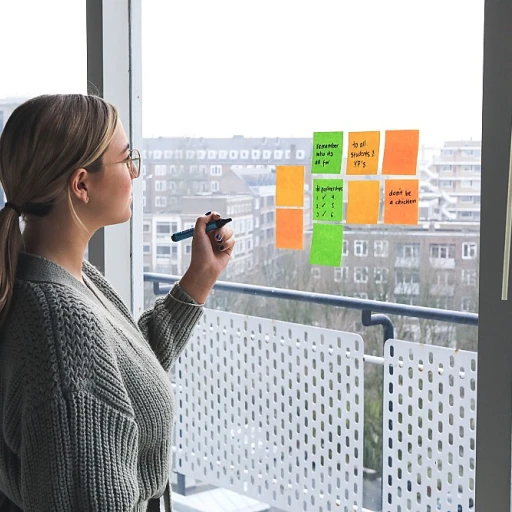
Understanding the Purpose of Internal Interviews
Grasping the Significance of Internal Interviews
Internal interviews are a crucial part of the hiring process within a company. They offer a unique opportunity to evaluate internal candidates who are already familiar with the company culture and have established relationships with team members. Understanding the purpose of these interviews can help both the hiring manager and the candidate align their expectations and objectives.
For the company, internal interviews serve as a tool to assess the potential of current employees for new roles. This process not only supports internal mobility but also helps in retaining talent by providing career advancement opportunities. It allows the hiring manager to evaluate the candidate's performance in their current role and their readiness to take on new challenges.
For the candidate, an internal interview is a chance to showcase their skills and demonstrate how they can contribute to the new role. It is an opportunity to discuss their career aspirations and how they align with the company's goals. This process also allows them to highlight their problem-solving abilities and how they have contributed to the team’s success.
Moreover, internal interviews can help in identifying any potential biases that may exist within the hiring process. By focusing on the candidate's skills and performance, hiring managers can make more informed decisions that benefit both the employee and the company.
For more insights on what to expect in specific roles, such as a product manager position, you can explore what to expect in a MediaTek product manager interview.
Preparing for the Internal Interview
Getting Ready for the Interview Journey
Preparing for an internal interview is crucial as it plays a significant role in shaping your career trajectory within the company. This process demands an understanding of what the internal interview entails compared to external ones. Here’s a structured approach to get ready for the internal interview.
- Know the Company Culture: Familiarize yourself with the unique aspects of your company's culture and values. This knowledge not only informs you about what the company prioritizes but also helps in aligning your responses during the interview process.
- Review Job Descriptions: Thoroughly read the job descriptions to understand the responsibilities and skills required for the new role. This understanding assists you in tailoring your answers to demonstrate your capability effectively.
- Reflect on your Current Role: Evaluate your performance and accomplishments in your current role to identify the skills and experiences that can be leveraged for the new position. Highlighting these achievements can make your candidacy stronger.
- Tackle Interview Questions: Prepare for standard and role-specific interview questions that hiring managers may ask. Practicing these questions can ease anxiety and enhance your performance during the actual interview.
- Understand Team Dynamics: Gaining insight into the team members of the department you’re targeting prepares you for adapting to the new workspace and reduces ambiguity about team dynamics.
Incorporating these strategies will not only help you perform better during your internal job interview but also boost your confidence, enhancing overall career progress within the organization. For a comprehensive guide, you can explore more strategies in navigating the interview process.
Essential Questions to Ask Candidates
Probing for Insightful Answers
During an internal interview, asking the right interview questions can significantly inform the hiring decision. Crafting questions interviewer teams should focus on requires paying attention to the specificities of the current role and how the internal candidate's skills will align with it. Here are some key questions that can help in assessing whether the candidate is well-suited for the position:- Reflection on Existing Experience: Ask candidates about how their experience and performance in their current role have prepared them for this new job. This question helps in understanding their self-assessment and dedication to their career progression.
- Understanding Team Dynamics: Inquire about their experiences working with existing team members. Understanding how an internal candidate meshes with the company culture and how effectively they collaborate within a team can indicate potential success in the new role.
- Role-specific Challenges: Probe into how the candidate plans to tackle the specific challenges of the new job. This not only reveals their problem-solving abilities but also shows their understanding of the role's demands.
- Adaptability and Internal Mobility: Understanding a candidate’s willingness to adapt to new responsibilities and opportunities for internal mobility can provide insight into their long-term potential within the company. This is a question hiring managers should prioritize.
- Insight into Leadership and Ambition: For roles involving leadership or coordination of a team, ask candidates to describe instances where they led a project or how they envision mentoring other employees. This can reveal their managerial capabilities or their vision for their career within the company.
- Assessing Feedback Reception: It’s valuable to assess how candidates handle feedback and criticism. Ask for examples of constructive feedback they've received and how it influenced their work.
Evaluating Candidate Responses
Analyzing Candidate Responses: Key Considerations
Evaluating candidate responses during an internal interview is a critical part of the hiring process. As an interviewer, understanding how a candidate's answers reflect their skills, experience, and potential fit within the company and team is essential to making an informed decision.
Here are some important factors to consider when evaluating responses from internal candidates:
- Alignment with Company Culture: Does the candidate's answers demonstrate a good understanding and alignment with the company culture? This will help ensure that they will work well within the existing team and contribute positively.
- Problem-Solving Abilities: Pay close attention to how candidates address problem-solving questions. Their approach to finding solutions can offer insight into their analytical and critical-thinking skills.
- Clarity and Relevance: Are the candidate's responses clear and relevant to the job interview questions? This can indicate their ability to communicate effectively—a crucial skill for any role.
- Growth Potential: Observe whether the candidate shows eagerness for career development and internal mobility. A discussion on past projects or roles can highlight their potential to take on new challenges.
- Team Interaction: Evaluate how well the candidate understands the dynamics of working in a team. Insight into past collaborations can reflect their interpersonal skills and ability to contribute to team success.
By focusing on these areas, hiring managers can effectively assess whether an internal candidate has the necessary qualities to excel in the new role. It's important to remember that a thorough evaluation of responses aids in reducing potential biases in the interview process, as discussed in previous sections.
Addressing Potential Biases
Mitigating Unconscious Bias in the Internal Interview Process
When conducting internal interviews, it's crucial to address potential biases that might inadvertently influence decision-making. Recognizing and mitigating these biases can ensure a fair assessment of all candidates.- Awareness of Bias: Hiring managers and interviewers should be aware of the different types of biases, such as affinity bias, which may lead them to favor candidates similar to themselves in the company culture, or confirmation bias, which can make them focus on information that confirms their pre-existing beliefs about a candidate's performance or suitability for the role.
- Structured Interview Process: Implementing a structured interview process with standardized interview questions helps in maintaining objectivity. A consistent set of questions for each candidate reduces the risk of subjective evaluations and ensures all internal candidates are assessed based on the same criteria.
- Diverse Interview Panel: Engaging a diverse panel of interviewers can offer varied perspectives, providing a well-rounded evaluation of each candidate. Team members from different backgrounds can help challenge potential biases and enhance the fairness of the interview process.
- Focus on Skills and Performance: Emphasizing skills, qualifications, and past performance indicators over subjective measures of "fit" helps in concentrating on the candidate's ability to perform the responsibilities of the new role effectively. Evaluating specific questions related to problem-solving and career achievements can provide insight into the candidate's potential success in the new role.
- Feedback and Training: Ongoing bias training for team members involved in the interview process can reinforce awareness and provide strategies to counteract bias. Feedback sessions among the hiring team can also uncover any underlying bias and create an open dialogue for improvement.
Making the Final Decision
Formulating a Thoughtful Decision-Making Framework
The culmination of the internal interview process is making a well-informed decision about the candidates who will transition into the new role. This phase requires a balance between objective evaluation and consideration of the company's broader goals. Here are some guidelines to ensure the decision is made with due diligence:- Summarize Key Insights: Begin by collating insights from each segment of the interview process. Consider the candidate's responses to critical interview questions, their alignment with company culture, and their ability to fit seamlessly into the new team dynamic.
- Assess Skill Compatibility: Review the candidate's current role performance and any new skills showcased during the interview. Match these against the requirements of the role to ensure they possess the requisite capabilities for future success.
- Involve Multiple Stakeholders: Involving team members and other hiring managers can provide a balanced perspective. Joint evaluations help mitigate potential biases and offer a more holistic view of the candidate's suitability, based on a spectrum of opinions and evaluations.
- Focus on Long-Term Impact: While immediate job performance is important, consider the candidate's potential for long-term growth within the company. This includes evaluating their interest in internal mobility and how they envision contributing to the company’s evolution.
- Reflect on Interview Dynamics: Consider how well the candidate interacted with interviewers and how they handled question-based scenarios. Their approach to problem solving during the interview can be a crucial indicator of future job effectiveness.













